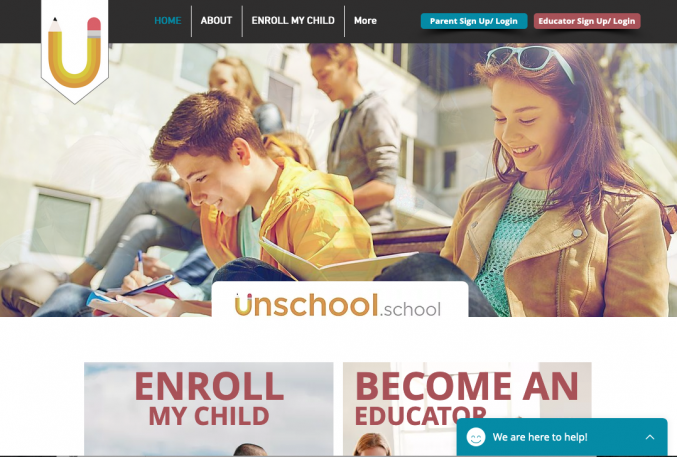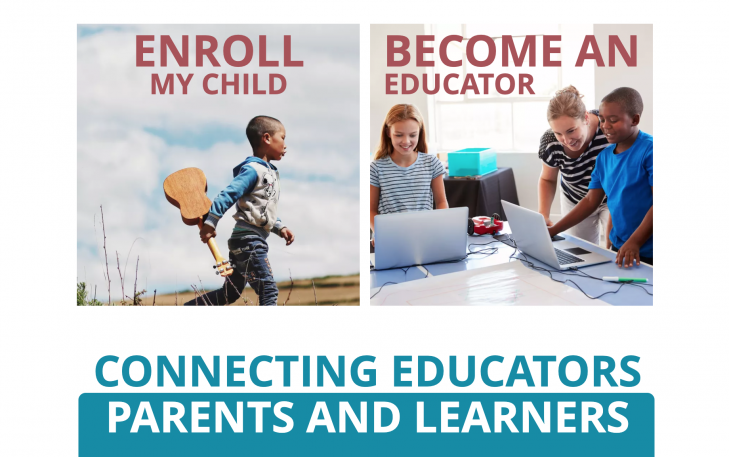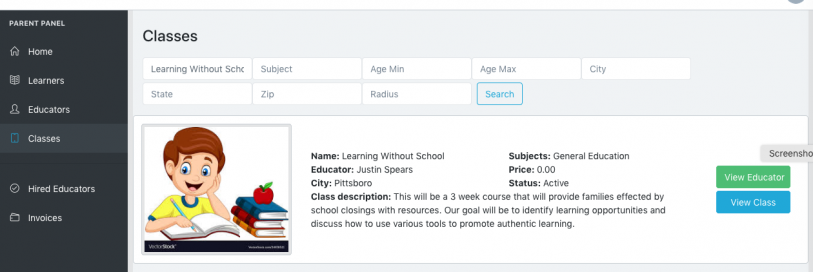Shauna Anderson was a high school English teacher—but now she leads Homeschooling 101 classes online via the new education marketplace Unschool.school, helping parents who have suddenly found themselves home with their kids.
According to Education Week, 46 states and many more cities have closed schools for two weeks or more across the U.S. in response to the COVID-19 pandemic. These closings affect 54.5 million children—over 96% of all children in schools. Some schools in Texas and California may be closed until summer.
The changes to families’ daily schedules can be stressful. Many parents are juggling jobs in addition to the increased time with their kids. It’s not easy to balance work, even remote work, with teaching (or at least entertaining) one or more children. But the pandemic may also give parents the opportunity to rethink conventional K-12 schooling and see what else is out there—such as homeschooling.

Anderson’s class offers tips, ideas, helpful websites, and support to new “accidental” homeschoolers. Because she is based in California, she shares guidelines about California’s homeschooling regulations, discusses online curriculum choices, and explains how to help your children navigate through this time at home. Anderson also has a resource list for parents with recommendations for free online educational activities, such as virtual field trips, documentaries, and project ideas.
“My main takeaway from the class is that your kids are going to be okay no matter what,” Anderson says. “Give everyone a lot of grace during this time—you, kids, teachers. Homeschooling isn’t school at home.”
https://www.youtube.com/watch?v=XuB6Qc-EgEc&feature=youtu.be
Anderson’s class is available at Unschool.school, which aims to bring underutilized educators, such as retirees and subject-matter experts, together with families and learners in underutilized daytime spaces, such as art studios and spare dining rooms—like an Airbnb for education. For example, the Makery, a maker space and art studio in Brookline, Massachusetts, was already offering after-school classes for kids, as well as adult programming. They were delighted to offer new classes for local homeschoolers via Unschool.school in topics such as architecture, design, and art. Other educators are offering classes that range from single sessions to 12-week courses on topics such as the history of American presidential elections, songs that have changed the world, and science and math skills.
The company’s namesake is the “unschooling” movement—a subset of homeschoolers who live life as if school doesn’t exist. As educator and unschooling pioneer John Holt wrote, “There is no difference between living and learning. . . . It is impossible and misleading and harmful to think of them as being separate.” Unschooled children direct their own learning. Parents facilitate. Unschoolers frequently cobble their weeks together based on the interests of individual learners, using a mix of self-directed projects, online programs and technology-based activities, and in-person classes. Around 20% of homeschoolers are unschooled.

Unschool.school, which was founded by Kerry McDonald, author of Unschooled: Raising Curious, Well-Educated Children Outside the Conventional Classroom, and Barry Hinckley, CEO and founder of event organization platform Yotme, helps these unschoolers find more places to learn. McDonald, in addition to being a successful author and entrepreneur, is an unschooling veteran. As part of their education, her four kids have attended art and programming classes at a local homeschooling learning center. They play at “park days” with other families. One child loves bugs, so McDonald takes her to the Harvard Natural History Museum to meet with an entomologist and then on nature walks to collect bugs for pinning and preserving. With Unschool.school, McDonald says her goal is to help shift education from one-size-fits-all to a personalized model by creating “a wide assortment of homeschooling and out-of-school learning experiences for many more learners.”

Though the company is now offering virtual classes, Unschool.school’s focus was initially 100% on in-person learning. The company believes that connecting small groups of learners with local educators leads to a high-quality, engaging education outside a conventional school setting. The idea appears to resonate: Since launching their beta platform on February 19, parents and educators were quick to sign up—over 600 people in the first two weeks. Two pilot programs in Boston and New York City sold out. But in light of the pandemic, the company is finding ways to move online. “Registrations are growing dramatically,” McDonald says.
Alternatives to conventional education
To mitigate the spread of the coronavirus, many colleges and universities have switched to all-virtual classes for the remainder of the semester. Some K-12 schools are following suit, but most do not have the resources to go all-out with cloud-based curricula. So, with the kids at home for an extended time, “many parents are scrambling to find information on homeschooling and learning outside of conventional schooling,” McDonald says.
Kerry McDonaldMany parents are scrambling to find information on homeschooling and learning outside of conventional schooling.”
For many families, the change will be temporary. Homeschooling and online classes are a stand-in while they wait out the pandemic. Then it will be back to school as usual. But others might find that classroom-free learning suits their kids’ needs better than a more typical education.
Studies have also shown that homeschooled children frequently perform highly on standardized academic achievement tests. They are typically above average on measures of social, emotional, and psychological development. Kids often rate their homeschooling experience highly and report happiness with life and satisfaction with their work. Many report loving the freedom, independence, and time to explore their own interests that their self-directed education gave them.
In short: Homeschooled kids are doing great. “It’s been challenging for sure, but the wonderful things about homeschooling make it all worth it,” Anderson says. “Being with my kids is such a rewarding experience.” This is good news for parents who are now giving homeschooling a go—and for those who may stick with it when the coronavirus crisis subsides. “It’s unfortunate,” McDonald wrote for the Foundation for Economic Education, “that it takes a viral epidemic to spotlight the many alternatives to conventional K-12 schooling.”
One of homeschooling’s advantages is that kids’ learning can be fit around flexible work schedules. Anderson, who is a mom of six, was already balancing homeschooling with her work as an educational specialist for a personalized-learning public charter school, where she supports families in planning curricula and individual learning plans. She finds time to do both because “what takes 8 hours in school may only take half of that (or less for younger kids) at home.” She also explains that learning can happen anytime, so her kids do “a ton of learning at night and on the weekends.”
It’s clear there’s an increasing demand for education outside conventional schools. Around 2.5 million children in the U.S. are currently homeschooled, and researchers estimate that the number of families in the U.S. who homeschool increased 25% from 2012 to 2016.
Parents were already looking for alternatives—the pandemic is merely accelerating the pace of change.
Families choose homeschooling for many different reasons, including wanting to remove their kids from negative school environments, desiring more flexibility, or fearing that schools kill creativity. For Anderson and her husband, they had always planned to start homeschooling when their kids entered high school, since Anderson was already a high school teacher and figured she could apply her knowledge at home. But when their kids began struggling earlier, experiencing increasing anxiety and frustration in part due to large class sizes, they pulled the kids out sooner.
Today, around 50.8 million children are in public schools and 5.8 million in private schools, according to the National Center for Education Statistics. However, a 2019 survey by EdChoice showed that although 80% of U.S. students ordinarily attend a local district school, less than a third of their parents want them there. Parents were already looking for alternatives—the pandemic is merely accelerating the pace of change.
In person or online? Technology enables both
Right now, everyone is focused on online education options. Unschool.school is just one of many edtech companies making free resources available to families, such as Anderson’s Homeschooling 101 class. Most of their other spring classes, which were originally going to be taught in person, have been moved online. Other resources for parents include ABCmouse, which offers a learning program covering reading, math, art, music, and more with games, books, and puzzles, and BrainPOP, which provides learning games and movies across a wide range of topics in STEM, reading, writing, and social studies. You might already be familiar with Khan Academy, an education nonprofit that offers practice exercises and instructional videos in STEM, history, and more.
Unlike many of these companies, Unschool.school focuses on connecting people with each other, leaving content creation and class instruction up to the educators who sign up for their platform. Although the coronavirus crisis led Unschool.school’s educators to move many of their spring classes online, McDonald said that the company still believes in the importance of in-person teaching and learning, and hopes to return to that focus sooner rather than later. One company, Outschool, is similar to Unschool.school in that it also activates the underutilized supply of educators, allowing them to choose what to teach and set their own prices for online-only classes, while learners can sign up for any class that interests them.
Other in-person options include the Prenda microschool network, which serves over 550 students in Arizona, and collaborative education centers such as Open Connections in Philadelphia and the Macomber Center in Framingham, Massachusetts, which give learners tremendous freedom and independence. Most of these in-person alternatives are small and local, reflecting the trend for unschooling to be decentralized and personalized. They all frequently include mixed-age groups, small community-based classes, and a one-room schoolhouse feel.
With all these new ways of schooling available, families will be able to choose the kind of learning environment and education that works best for their kids when the pandemic is finally over—whether that’s in a conventional school or not.
Jacqueline M. Kory-Westlund is a mother, scholar, writer, and artist. She earned her PhD from the MIT Media Lab in 2019, where her research focused on social robotics, children’s learning and relationships, and robot ethics.
Recognize your brand’s excellence by applying to this year’s Brands That Matter Awards before the early-rate deadline, May 3.
